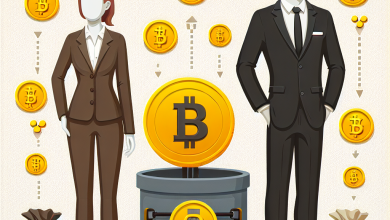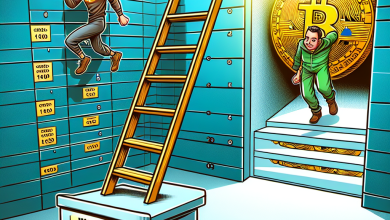Dollar news: Fund manager Ronald-Peter Stöferle in an interview
WirtschaftsWoche: Mr. Stöferle, is part of the world turning away from the dollar as the dominant trading and reserve currency?
Ronald-Peter Stoeferle: The topic of de-dollarization has been on our radar for years. Now it’s suddenly becoming mainstream, the Financial Times is dedicating itself to the subject, even Fox News.
Then WirtschaftsWoche is a trendsetter. Ten years ago we had a headline: “The end of the petrodollar”.
Others are only now noticing the dollar’s declining importance. It is the result of a process that ran over a long period of time.
What was the trigger?
First, a look back at currency history: Measured in terms of economic output, the USA had already overtaken the British Empire as the most important economic power in 1872. After that, the pound sterling continued to be the world’s most important reserve currency alongside the dollar for many decades.
To person
Ronald-Peter Stöferle, 42, is a partner and fund manager at the independent investment boutique Incrementum in Liechtenstein. Born in Vienna, he has been writing the internationally acclaimed “In Gold we trust” report since 2007. The next issue will appear at the end of May.
So today, by analogy, could speculation about a dollar demise be premature?
It was not until 1946 that the dollar actually replaced the pound. In this respect, I actually believe that it will take some time before this process is completed.
So the dollar will remain the dominant trading and reserve currency for the time being?
As a transaction currency, the dollar is still the clear number one. Not that much will change about that either. Louis-Vincent Gave, co-founder of Gavekal Research in Hong Kong, compares the dollar to Microsoft’s Windows operating system. It’s not perfect either, but everyone uses it. So there is a very strong network effect. If the world now switched to a completely new operating system, it would probably not work at first because the changeover would be very difficult. The network advantages should not be underestimated.
So the dollar has a liquidity advantage?
Correct. The US continues to have the most liquid bond market in the world. Take the UK bond market for comparison. Trading in British government bonds, so-called Gilts, almost collapsed last autumn. And in Japan there was no domestic government bond trading at all for several days.
However, China now conducts oil deals with the Gulf States in renminbi.
China’s President Xi Jinping said some time ago that his country wanted to work more closely with the Gulf States in the energy sector. The Shanghai Petroleum and Natural Gas Exchange is to be used as a platform for trading in Renminbi. Since then, much has been said about the descent of the petrodollar and the rise of the petroyuan.
Also read: The dominance of the dollar is not (yet) in danger
Is the power structure shifting on the world stage?
There’s a lot going on there. The peace negotiations between Saudi Arabia and Iran, for example, were orchestrated by China. Brazil’s President Luiz Inácio Lula da Silva was more likely to be courting the Chinese when he said the US must stop promoting the war. And Emmanuel Macron recently drew particular attention with his demand that Europe should not become a “vassal” of the USA. Incidentally, the French energy group TotalEnergies handled a delivery of liquefied natural gas from the United Arab Emirates to China in Renminbi.
Allegedly, an Airbus order from China is also invoiced in renminbi.
I’ve heard the rumor too, but have no confirmation of it. It probably didn’t go over so well in the US.
Is China preparing to internationalize the renminbi?
If the Beijing government really wanted to go in that direction, it would have to float the currency, lift capital controls, let capital flow in and out of the country. I don’t think Beijing is ready yet.
Is the dollar’s dominant status as a reserve currency crumbling?
Well, it’s still 58 percent of the world’s foreign exchange reserves held in dollars, versus 20 percent in euros and 5 percent in Japanese yen. In Renminbi it is less than three percent.
Many countries, above all China and the Gulf States, still hold a large part of their currency reserves in US government bonds, simply because they trusted that they were liquid investments. Is that trust fading?
A key point here is the militarization of money in the context of sanctions by the US and its Western allies against Russia. In March 2022, they simply said: Dear Russians, your 700 billion dollars in currency reserves with us are de facto worthless. All those states that aren’t necessarily friends of the USA or that are simply pursuing realpolitik, such as the Indians, who are now happy about Russian oil at a discount, have been shaken awake…
… and stock up on their gold reserves as a precaution.
It is certainly no coincidence that last year we saw the largest central bank purchases of gold in more than 60 years and that things are continuing to briskly this year. They are looking for a medium that has no counterparty risk, is traded anywhere in the world 24 hours a day and almost always embodies a certain value. The Chinese have recently officially announced that they are buying gold. This symbolic character should not be underestimated.
What signal does it send?
The signal is: We want to diversify out of the dollar. China, but also India, Brazil or Indonesia, all these upstarts, as I call them, want to be taken seriously at the negotiating table. That’s understandable. They have more demographic tailwinds, their growth rates are better — and they have the commodities that are essential in all areas.
Are China and the USA caught in the Thucydides trap, i.e. is there a threat of a military conflict between the rising power and the existing superpower?
The great hope is, of course, that the increasing friction will not explode into wars. Unfortunately, this has happened many times in history.
Also read: The rising price of gold is a vote of no confidence in the dollar





